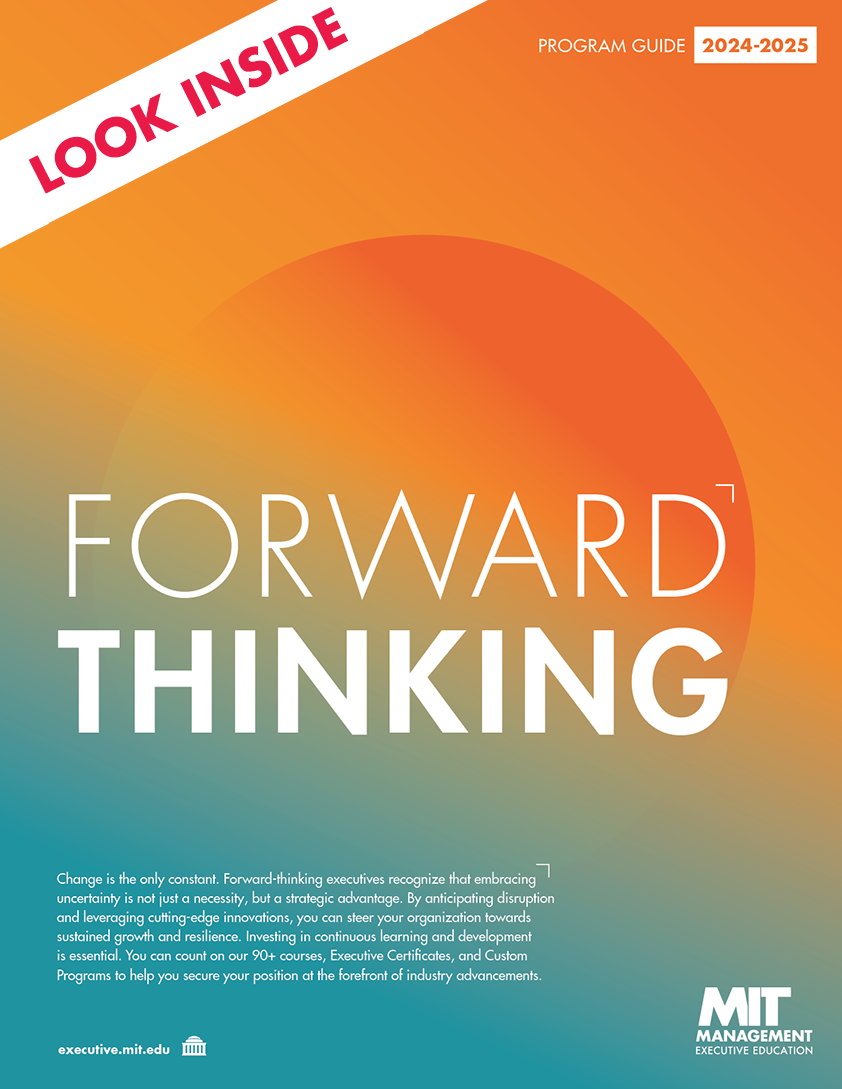Focusing on the importance of soft skills (social and communication skills) doesn’t always feel comfortable or easy. Yet soft skills, especially given today’s uncertainties, are more vital than ever personally and professionally. They are what set great managers apart from good managers – and there is data, science, and research to support this.
In their recent webinar, Meg Regan (MIT Sloan Lecturer) and Jen Armstrong (Founder and Coach, Bright Chirp Consulting) explored how taking a coaching approach to leadership – and tapping into these soft skills - not only helps managers enhance their overall leadership skills – but the productivity and satisfaction of their teams as well.
We start with data (because we are, after all, MIT). Meg and Jen point to a study Google first implemented in 2008 to determine what makes a great manager in their company. (Some even wondered if managers were even needed with so many highly-skilled and self-driven team members). The research found that managers do matter and that good managers resulted in happier and more productive teams compared to their less highly rated counterparts. So, what makes a good manager? Employees listed being a good coach as the number one attribute. (Surprisingly, “technical skills” came in at only eighth on the list - trailing behind six other soft skills such as being “empowering” and “inclusive”).
The Coaching Mindset
Developing a coaching mindset isn’t rocket science, but it does involve a little patience and a little (maybe a lot of) letting go. It’s easy as a manager to offer your expertise and advice to your team. However, coaching is a shift from problem to person. You don’t offer the solution – your direct reports do. You might help them navigate certain issues, but you’re no longer directly managing the outcome. You are no longer the person with all the answers. And truthfully, in challenging times, you may not have the answer. (In fact, if you caught the previous webinar with MIT Sloan faculty Hal Gregersen, you may already understand the importance of questions versus answers).
Not having the answer creates new possibilities beyond your personal experience. Leading with inquiry and curiosity allows you to learn and develop as well. You can shift your focus to people development versus problem solving. You build trust and surface new, innovative ideas – you mitigate the temptation of micro-managing. All these actions help create happier teams.
Curiosity & Listening
When Meg and Jen have workshops at MIT, they spend a lot of time with leaders practicing and creating self-awareness. For some executives with many years of experience, letting go of that control and having conversations in a different way can be the most difficult part of the process.
This shift in mindset relies heavily on curiosity and listening. With curiosity, you’re setting your own opinion aside and being intentional about not knowing the answer so you can explore the problem from a new perspective. You are also listening to understand versus listening to respond. (How many of us are often guilty of the latter)?
To support curiosity it’s important to ask what Meg and Jen refer to as powerful questions – even if you think you know the answer. Questions should be:
- open ended
- thought provoking
- non-leading
- clarity seeking
- concise
If you’re trying to ease into this new territory, Jen suggests the best place to start is to simply ask “What do you think?” and then wait… and listen.
When you listen, you’re not just listening to absorb information, but to also understand what this means to the other person. It’s natural for your own perspectives to influence what you hear – so being aware of that bias can be quite powerful. There’s often a gap between what leaders think is going on and what’s actually happening – and this can be caused by a lack of listening. One way to correct this habit is to mirror back what people are saying. “What I hear you saying is X?” and then for added effectiveness add “Did I get that right?”
Practice Makes Perfect
While these methods are all rooted in common sense, the process of developing a coaching mindset does take intention and practice. Next step? Meg and Jen suggest a combination of reflection and action. Think about a past situation. How would you have applied the coaching approach? Where would it have been useful? Now, think ahead. How would you like to experiment with the coaching approach during an upcoming meeting or conversation?
Make some space to think about what you want to accomplish during these conversations and determine how you would start asking those powerful questions. With many teams now working remotely, it can be a bit intimidating to have these conversations in the virtual space or with larger groups. So think about how you can actually set up a discussion and how you can manage it ahead of time to ensure all the voices and perspectives in the room get heard. The more you practice, the easier and more natural it will become – not just for you, but for your team and the organizational culture overall.
Participant Q&A
Meg and Jen covered a lot in 30-minutes about coaching, but there were great questions during the Q&A they couldn’t address in that timeframe. They wanted to dive a bit deeper, so we collected them and curated answers to these questions below.
Is the coaching approach for any manager? Or are there different considerations/modifications depending on management level – mid-level vs C-suite for example?
M: The coaching approach can be used by anyone and in a variety of situations. As discussed during the webinar, it is a mindset – approaching things with curiosity and a desire to learn rather than knowing or telling. It is supported by asking powerful or curious questions coupled with empathic listening – listening to understand versus listening for facts. One can use a coaching approach in discussions with direct reports, peers, customers, managers, and leaders. The skill is in recognizing when a coaching approach will serve the person, team, or situation and the ability to shift from one approach to another, often in the same conversation or meeting.
As a leader, when there is a very real “risk” associated with a decision/situation – sometimes it’s hard to let go and leave things to your team – especially if you think they’re veering into questionable territory. When are appropriate times to step in and lead your teams back on the correct path? How can you do this without directly telling them and defeating the morale/productivity boosting benefits of the coaching style?
J: The coaching approach may not be useful in every situation. How and if you take a coaching approach depends on what you hope to accomplish. It can be used with a light touch (or not at all) in situations that feel urgent or higher risk. Sometimes opening a conversation with a single powerful question — like "What is most important here?” — is all you may need and may be all that is appropriate given your situation.
With many still working from home and just dealing with the pandemic in general - has this changed the approach of the coaching style of leadership? Are there special considerations or best practices to implement in an environment where your teams are now largely virtual?
M: I think the process is important for virtual meetings. In general, I would say in the pandemic suspending judgement is a must.
J: In some ways, the coaching approach may be even more useful right now as teams work virtually. Remember, with your coaching lens on, your focus is on the person rather than the problem. Understanding what another person is thinking and seeing during the pandemic may be important as we adjust to teaming virtually.
If you feel comfortable with the person or team with whom you’re working, you may also find it easier to share that you’re going to put on a different “lens” (i.e. the “coaching lens”) for all or part of the conversation. This isn’t intended to be a Jedi mind trick. Sharing that you are especially curious about what others are seeing, given the virtual world of work in which we find ourselves, could in and of itself add value.
M: If you are asking for ideas/input be sure you really are curious. Asking for the sake of asking and never acting on it will erode trust and engagement.
Tip for successful virtual meetings/exchanges, especially for larger groups:
- Use a process to allow all voices to be in the room in a manner that accommodates a number of various styles and comfort levels (i.e. set ground rules and norms; allow people to share by chat and/or verbally; provide the background and framing in advance so those requiring more space and time to formulate ideas/prepare for a meeting have what they need; facilitate by calling on individuals to share and let people know who is next)
- Mirroring and Acknowledging – use mirroring and acknowledging as part of facilitating
- Get feedback – find a quick way to get feedback from your teams on how things are going.
We all have preconceived ideas and projection bias – how are some ways to overcome and manage these default settings? Any best practices for being more self-aware during this process in order to have more effective coaching conversations so that you can support your team and encourage innovative thought without being a total puppet master behind the scenes?
J: A powerful self-awareness technique when adopting a coaching approach is to simply ask yourself what is motivating the approach and what is motivating your questions. If it is anything other than being curious, try to dig a little deeper into your motivations. Perhaps a coaching approach isn’t what the moment requires. Or, perhaps you are curious and just finding yourself leading with your own ideas out of habit. Understanding where your focus is can go a long way to make the coaching approach useful.
Meg Regan and Jen Armstrong teach in MIT Sloan Executive Education's Executive Coaching Program and Extended Executive Coaching Program.








